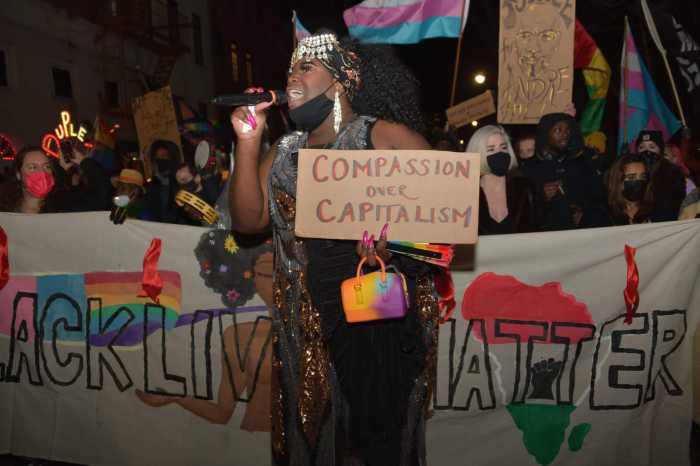In the 50 years since “Company” first bowed on Broadway in 1970, the world has changed radically in many ways. The desire to find love, companionship, a partner, however, has remained a constant. That’s why Mariann Elliott’s splendid revival retains the trenchant, often ironic, observation of the lead character, but moves that character to the center of the action, enriching the emotional life and contemporary relevance of the story.
Elliott’s major change has been to reconceive bachelor Bobby as bachelorette Bobbie who, on her 35th birthday, is looking at her life and her loves and wondering at this turning point what’s next for her. Other changes are era related. There’s no busy signal coming through the phone in the opening; references to an answering service are gone; a gay couple is introduced, and the characters carry smartphones. The differences — and the magic — are in the nuances.
Rather than observing her “good and crazy” married friends from the outside, putting Bobbie in the center of the action heightens both clarity and urgency for the character. As she encounters couples who have settled or are restless and unhappy, she emerges as a kind of emotional Diogenes, searching for an honest relationship, questioning herself and reviewing her choices.
George Furth’s book is based on 11 short plays he wrote in the 1960s. With no discernible plot and songs that are, for the most part, specialty numbers, it was considered unconventional in 1970. Since then, the songs have become staples of cabaret and piano bars, but the book is really just a series of vignettes. Sondheim and Furth designed the musical so it all takes place in Bobbie’s mind, and the real, elapsed time is probably five minutes just before Bobbie opens the door to her apartment, where a surprise birthday party is about to happen. This kind of time compression is a trope often used in movies, but it’s hard to pull off on stage. Elliott manages it, however, with an “Alice in Wonderland” conceit as Bobbie moves in a dreamlike manner between scenes with her friends. (Bunny Christie’s fluid, moving sets help create this atmosphere beautifully.)
As to the gender shift of the main character, while it initially seemed like a gimmick when the production was announced, it now seems imperative for the show to work in 2021. No one questions a 35-year-old man still being unmarried. However, the sexism — both cultural and internalized—that still exists around single women is the source of the conflict in this production. No man has to defend his single status because he wanted to pursue a career, but Bobbie — certainly in the context of her friends — feels compelled to. Elliott’s comprehension and expression of the relationship zeitgeist of 2021 makes the show immediate and powerful.
There is a quest-like feeling in the journey as Bobbie observes her friends’ choices and reviews some her own, for better or worse coming to a new understanding of herself. As a result, the final number, “Being Alive” is not the cri de coeur of someone who is desperate and alone but an assertion that as scary as it is to let someone in, Bobbie is ready…to take the risk and the consequences.
As Bobbie, Katrina Lenk delivers an extraordinary performance. She fills every moment, whether comedic or heartfelt, with complete honesty, and her singing is sublime. She’s surrounded by a dream cast that always provides the perfect foil to whatever Bobbie is experiencing.
The gender-switching is not limited to Bobbie. Amy and Paul in the original become the gay couple Jamie and Paul. On the morning of their wedding at which Bobbie is to be the maid of honor, Jamie has a total meltdown, expressed in “Not Getting Married Today.” Matt Doyle delivers this song in a breathtaking eruption of frenzy and neurosis that sets a new benchmark for this oft-performed number. Christopher Sieber and Jennifer Simard as Harry and Sarah are hilarious as they hide from the hypocrisies in their marriage. Simard can make a look side-splitting, and she is totally fearless as a comedienne. In another gender twist, Elliott has given the song “Another Hundred People” to Bobby Conte as PJ. He’s got a great voice and powerful technique, and to give this song about the difficulty of connecting in New York to a very attractive and seemingly confident man is inspired. As mentioned above, the magic of this show is in the nuances.
And then there’s Patti LuPone. As Joanne, the wealthy and world-weary older woman, she sings “The Ladies Who Lunch.” Till now, this song was inextricably associated with the original Joanne, Elaine Stritch, and it’s been covered, most likely, by every diva on the planet. Patti, however, being Patti, she finds every moment in the song as if it were new and shows us the existential sadness Joanne covers with her larger-than-life persona. As she did in other Sondheim shows, “Gypsy” and “Sweeney Todd,” LuPone digs and digs into the character and delivers all its colors and complexity with spellbinding honesty and humanity.
Sondheim’s death last month adds a sense of poignancy to this production. At the same time, it’s a celebration filled with joy as an incomparable artist’s work is brought to new life with a new vision.
“Company” is a show about how much we need to connect, how difficult it is, and how intimidating the world can be. And yet, against all odds, we do it anyway. Elliott and her magnificent crew remind us that the doing is mandatory if we are truly going to be alive.

















